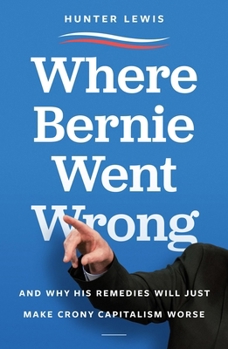Where Bernie Went Wrong: And Why His Remedies Will Just Make Crony Capitalism Worse
Select Format
Select Condition 
Book Overview
When Bernie Sanders announced his campaign for the Democratic nomination for president on April 30, 2015, few people took much notice. Here was a 73-year-old US Senator from the tiny state of Vermont taking on Hillary Clinton, who seemed to have the nomination locked up.
Although Sanders had caucused with the Democrats, he had always heretofore run as an Independent. Brooklyn born, he was also the first person of Jewish faith to mount a serious campaign for president. Balding and looking like everyone's grandfather, he was neither a brilliant speaker nor a brilliant political tactician. What he did have was conviction in his beliefs, which he frankly described as "Socialist," and a determination to mount a "revolution" against the existing political and economic establishment.
As improbable as this campaign was, it immediately took flight. Millions of voters, especially young people, joined "Bernie's army." In state after state, he won Democratic voters under the age of 40 by overwhelming majorities. His fervent supporters made almost a million small gifts to the campaign, average size $31. This was unheard of.
What motivated Bernie to undertake his ground breaking campaign? First and foremost, he was appalled by the economic inequality of American society, which he felt was getting ever worse. He wanted to tax the rich and especially Wall Street much more heavily in order to finance more Social Security and Medicare for all, among other expanded government programs.
Sanders planned to jumpstart the economy by vastly increasing government investments in "infrastructure" such as roads and bridges. He would raise the minimum wage to $15 an hour for a start and keep raising it. He would open US borders to immigration while simultaneously cutting back on open borders for trade.
Would this program work? Would it lead to the intended outcome? Where Bernie Went Wrong considers this question and concludes that while Sanders is right in calling for a revolution against today's political and economic elites, his proposed solutions would actually make the plight of the poor and middle class even worse.




